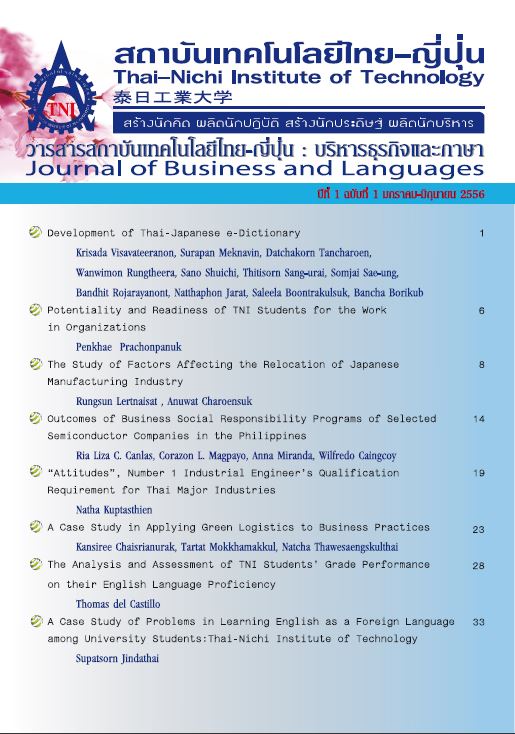ปัญหาจากสิ่งแวดล้อมต่างวัฒนธรรมไทย-ญี่ปุ่น ในอุตสาหกรรมการผลิตของญี่ปุ่นในประเทศไทย และผลกระทบต่อ MONOZUKURI
Main Article Content
Abstract
This article describes a research which was conducted to investigate the differences between Thai and Japanese culture within Japanese manufacturing firms in Thailand and their impact to MONOZUKURI which aims to satisfy customer requirements. A large number of Japanese manufacturing firms have been establishing in Thailand for years while work culture conflicts between Thai and Japanese remain unsolved. The objectives of the research aim to identify cross cultural problems between Thai and Japanese in workplace, to identify their impact to MONOZUKURI activities, to propose management approach to reduce the gap between Thai and Japanese culture, and to provide implementation guideline of MONOZUKURI under cross culture environment. The research was conducted by qualitative research method with purposing sampling of interviewing Japanese executives and Thai management. The findings indicated there are high degree of differences between the culture of Thai and Japanese employees which lead to many problems and have a great influence on MONOZUKURI. These problems impact directly to MONOZUKURI on quality of products and/or services and on customer satisfaction. Therefore, the culture gap can be managed by top management policy, education, workshop, evaluation and control. Consequently, HRD policy from headquarters or parent companies regarding to cross cultural management is essential to oversea bases of Japanese firms.
Article Details
Article Accepting Policy
The editorial board of Thai-Nichi Institute of Technology is pleased to receive articles from lecturers and experts in the fields of business administration, languages, engineering and technology written in Thai or English. The academic work submitted for publication must not be published in any other publication before and must not be under consideration of other journal submissions. Therefore, those interested in participating in the dissemination of work and knowledge can submit their article to the editorial board for further submission to the screening committee to consider publishing in the journal. The articles that can be published include solely research articles. Interested persons can prepare their articles by reviewing recommendations for article authors.
Copyright infringement is solely the responsibility of the author(s) of the article. Articles that have been published must be screened and reviewed for quality from qualified experts approved by the editorial board.
The text that appears within each article published in this research journal is a personal opinion of each author, nothing related to Thai-Nichi Institute of Technology, and other faculty members in the institution in any way. Responsibilities and accuracy for the content of each article are owned by each author. If there is any mistake, each author will be responsible for his/her own article(s).
The editorial board reserves the right not to bring any content, views or comments of articles in the Journal of Thai-Nichi Institute of Technology to publish before receiving permission from the authorized author(s) in writing. The published work is the copyright of the Journal of Thai-Nichi Institute of Technology.
References
M. Arakawa, Japanese Style MONOZUKURI “Art of Japanese Style Manufacturing” (Nihon no MONOZUKURI “Nihon Keijutsu no Seiso”), Lecture Notes in the Training Program on Industrial Management for Thailand #2 for the Enhancement of Industrial Human Resources with MONOZUKURI Management Capability, Osaka, Japan: Feb 2007, p. 43.
Y. Koga, “Don’t Wait until It Happens! Follow the Way to Workplace Safety!! (Okottekara dewa Osoi! Iroha de Tadoru Genba Anzen no Michi!!),” Factory Management (Kojo Kanri), Vol. 55, p. 98-99, Oct. 2009.
H. Sasaki, Power of MONOZUKURI Structure (MONOZUKURI SOshiki Noryoku), Biken, Japan: 2008.
T. Tajima, Isuzu Manufacturing Management (Isuzu Seizo Keiei), Lecture Notes in Japanese Management, Bangkok, Thailand: Oct. 2008, p. 145.
T. Fujimoto, Strategic Theory of MONOZUKURI Integrated Model (Sougou Kata MONOZUKURI Senryokuron), in MONOZUKURI Management (MONOZUKURI Keieigaku). Kobunsha, Japan: 2008, 3th printed. 21-32.
F. Nagai, “The Role of Culture Influences in Japanese Communication: A Literature Review on Social and Situational Factors and Japanese Indirectmess,”” Intercultural Communication Studies, Kanda University of International Studies, Japan: 2002.
G. Hofstede, Culture's Consequences : Comparing Values, Behaviors, Institutions, and Organizations Across Nations, 2nd ed. Sage, the United States of America: 2001.
F. Graetz, M. Rimmer, A. Lawrence and A. Smith, Managing Organizational Change, 2nd ed., John Wiley & Sons, Australia: 2006.
M. Hitt, C. Miller and A. Colella, Organizational Behavior; A Strategic Approach, Von Hoffmann,New York: 2006.
K. Nakae, “Cultural Change: A Comparative Study of the Change Efforts of Douglas MacArthur and Carlos Ghosn in Japan,” M.B.A. Thesis, Sloan School of Management, Massachusetts Institute of Technology, U.S.A., 2005.
J. Black, “Toward a Comprehensive Model of International Adjustment: An Integration of Multiple Theoretical Perspectives,” Academy of Management Review, vol. 16, no. 2, pp. 219-317, 1991.
L. Woolgar, “University Industry Links Personnel and Training in Japan: A Review of Survey Results,” Discussion Paper No. 49, Second Theory Oriented Research Group, National Institute of Science and Technology, Ministry of Education, Culture, Sports, Science and Technology, Oct, 2008.
J. Ortega, “Job Rotation as a Learning Mechanism,” Management Science, vol. 47, no. 10, pp. 1361-1370, Oct. 2001.
T. Peters, In Search of Excellence, Warner Books Edition, the United States of America: Harper & Row, 1982.
T. Ogawa, “Human Resource Education and Development (Jinzai no Ikusei Kaihatsu),” Info BIZ Thailand, vol. 152, pp. 7, Aug. 2010.
Y. Zhu, “Responding to the Challenges of Globalization: Human Resource Development in Japan,” Journal of World Business, vol. 39, iss. 4, pp. 337-345, Nov. 2004.


